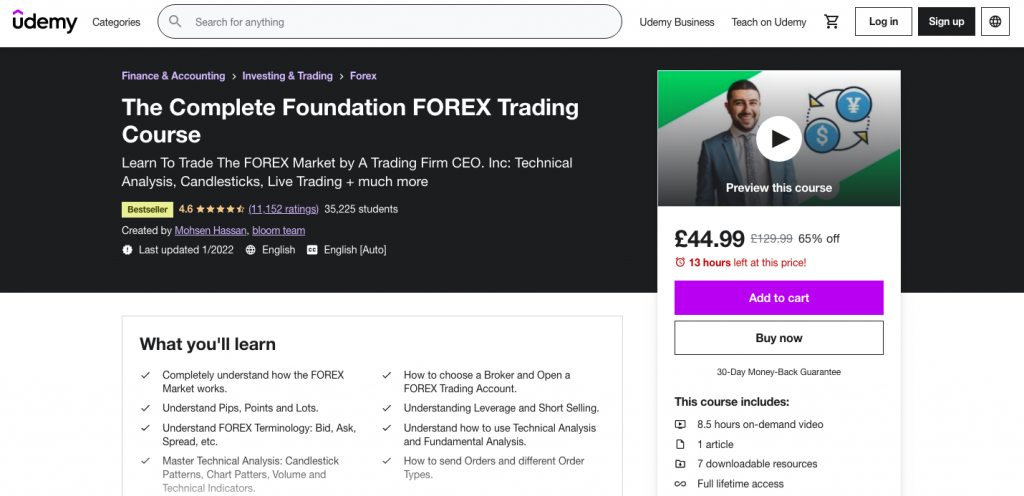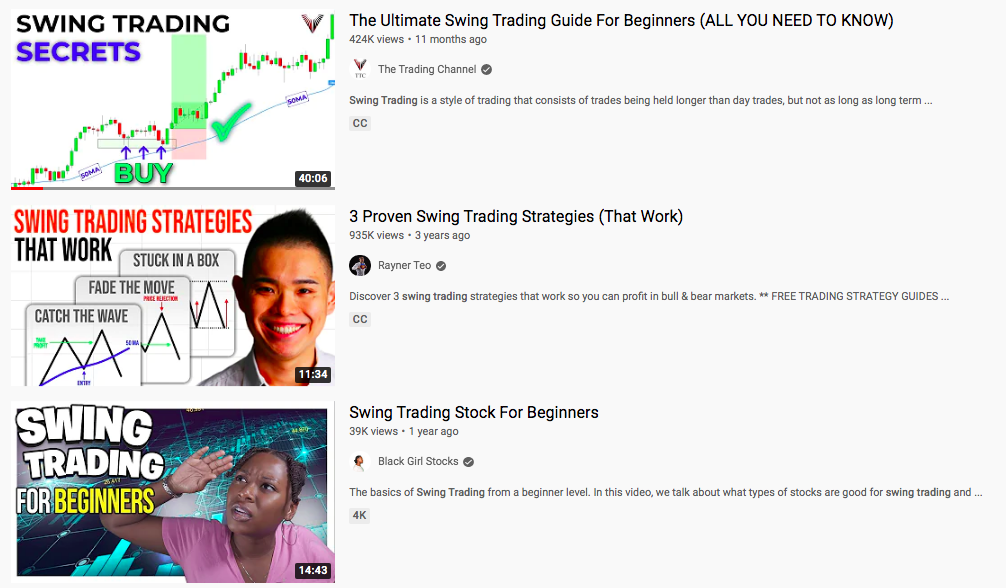Trading Education



Online trading education can help you develop an investing strategy and differentiate between brokers. Not only essential for beginners, but educational content is also important for seasoned traders. Many free and paid online courses provide everything from basic chart reading, to in-depth technical analysis training. This guide to swing trading education will cover why it’s necessary and how to evaluate different resources.
Learning & Development
Trading education is something that all traders, regardless of expertise, should seek. Whether you are taking your first steps or already have years of experience, there is always something you can learn which will benefit your swing trading activity.
It’s worth taking your time to learn about trading, as jumping straight into making large trades can lead to significant losses. With that said, professional traders can still make common mistakes if they haven’t honed their strategies effectively. In addition, markets are ever-changing, so staying up-to-date with tips and tricks can stop you from falling behind and making losses.

Where to Start
When you are researching your trading education options, you should have a good idea of what you are looking for. If you are a novice with little or no trading experience, you may want to look for a course that will give you a breadth of knowledge across the most accessible markets or instruments.
For those who wish to learn the basics of trading, you may want to focus your learning on a particular topic, such as swing trading. Accomplished traders, on the other hand, will want to find more advanced resources that provide top-level information on new automated software, for example.
The type of education you choose may also impact the broker or exchange you decide to trade with, as most companies will offer learning resources on their platform. This guide will tell you what to look for when deciding which broker you wish to open an account with. From this, you will learn how to evaluate their reliability and trustworthiness, how to execute a trade, and what assets are available on the platform.
Stocks & Shares
With records showing evidence for stock markets as far back as the 16th century, trading shares in companies is one of the most popular instruments. Because of this, there are a plethora of online trading education resources that provide teaching on how exchanges work, investment strategies and how to identify a potential asset.
In addition, you should learn about key indices such as the Nasdaq or FTSE 100, which are groups of particular company stocks. These are often a reflection of major economies and will teach you how geopolitical events can impact the value of particular industries, such as technology and financial services.
Currencies
Forex, or ‘foreign exchange’, involves the trading of one currency for another. The aim of making a forex trade is to benefit from the ever-changing exchange rate between major, minor and exotic currencies.
While forex focuses on fiat currency, digital coins (cryptocurrency) have seen a boom in recent years. The high volatility has attracted traders to crypto by investing in anything from well-known assets such as Bitcoin and Ethereum, to ‘meme’ coins like DogeCoin. As crypto is still relatively new, there is currently not as much trading education available compared to forex.
Derivatives
A derivative is a special form of trading that speculates on the value of an underlying asset. Rather than purchasing and investing in an asset, with a derivative such as a futures or a binary options contract, you are predicting the asset’s price for a given time. Derivatives trading education can help show how to identify suitable assets as well as when to enter or exit a position.
Trading Education Methods
There are several different types of online trading education. This will range from hands-on, practical experience with demo accounts to more classroom-style teaching with video tutorials. The most common examples of education you will encounter are as follows:
Online Courses
Trading education courses typically require a lot of invested time with lessons spanning lectures, webinars, seminars or videos. With certain courses, there will be an opportunity to discuss trading with the teachers or mentors during a designated Q&A session or a 1-to-1 live chat. During these sessions, you can put forward any issues you have encountered with trading and find an expert’s opinion on possible solutions.
These courses can be found on many websites such as Coursera, Udemy and ForexSignals.com.

PDF Guides
This method of trading education is usually easy to access and can be presented in a range of different formats. Typically, they are also free to access and download but often comes with a limitation in detail.
Even though they are comparably brief, they can cover some very useful information to form a good starting point. PDF guides can be regularly updated to keep the information and advice applicable to current market conditions.
Books & eBooks
Books and eBooks are a thorough learning method. The authors will have spent a lot of time researching and writing so there will usually be plenty of detail. Arguably, they are one of the better trading education methods for people with little time to invest as books can be read at your own speed and time, for example, during your commute to work.

Demo Accounts
Demo accounts are a perfect way to gain some experience in a risk-free setting. One of the most important parts of obtaining a complete trading education is the practical element.
Demo accounts use simulated funds rather than real funds and so allow you to trial strategies or test trading methods. They can also help you to learn good habits for live trading.
Comparing Trading Education Resources
You need to know what to look for when comparing trading education resources, as not all are the same. You will find that there is a range of quality and purpose, so it can be hard to make a decision on which source to choose. Below we break down the key criteria you should consider:
Methods
A big part of trading education is how you are being taught. People learn best in different ways and so what works for one person may not work for another. You should consider how much time you have to invest into learning about trading. For example, having plenty of time may allow you to subscribe to larger courses with daily lessons.
Another consideration is whether you have particular weaknesses that need addressing. Reading a book or guide could help you, but you may want to find an option where you can discuss your queries with an experienced trader.
Content
Another important factor for evaluating trading education is what you will be learning about. Consider what you want to gain from this education, whether it is something about specific strategies or just learning the basics. For example, if you want to look at making trades over several days or weeks, then look at swing trading education rather than day trading.

Experience
How experienced you are will also influence what content is best for you. If you are a novice then look at entry-level trading education, as it’s vital to cover the basics first.
If you have some experience but still feel like you could improve on recognising trends and trades, look at intermediate level education. Experienced traders should find an advanced-level course to avoid wasting time and money by learning the basics again. There are plenty of courses that can further hone your talents to improve your returns.
Price
The price of certain forex trading education, for example, will influence how accessible it is to you. Whilst several educational resources are free to download and access, you can expect to pay for a more thorough education. Some resources offer a free trial period so you can test the waters before making a full commitment.
Also, keep an eye out for promotions or referral schemes as they are relatively common and can help you save money. Just remember that any money spent on trading education is less to spend on making trades.
Reviews
Reviews are a good way to see how accessible or detailed certain trading education is without using it yourself. You can find discussions on websites such as Reddit, Twitter, Facebook, Trustpilot and numerous blogs and forums. Remember to take these reviews with a pinch of salt as they are just opinions that may not paint the full picture.
Example Resources
There are many websites for trading education but below are a select few that are popular amongst traders.
Academy of Financial Trading
Academy of Financial Trading Limited is a London, UK-based business that provides financial trading education services. There are courses on a range of topics including commodity trading such as gold and oil, plus stocks and shares. The education includes opportunities to chat with the mentors, followed by exams and a completion certificate. There are two tiers of difficulty split up into the Foundation Trading Programme and the more-advanced Ultimate Traders Programme.
Warrior Trading
Warrior trading provides education on how to day trade via YouTube videos, a simulated trading platform and eBooks. The first class is free, after which you must purchase either a Starter Program or Pro Course.
The Starter Program costs $997 for the first month and then $197 per month afterwards. The Pro Course has two payment plans: $5,997 for a year or $4,297 for 90 days with a monthly fee of $197 following. For this price, you have access to a range of teaching for day trading and swing trading topics.
Quantum Trading
Quantum Trading was launched and is run by Anna and David Coulling. They have many years of experience and the website provide indicators trading education. You can purchase packages of indicators for platforms such as MetaTrader 4 and 5, for example, the crypto strength indicator. The full package of indicators for MT4/5 is $894 but individual indicators range from as low as $17 up to $497.
Investopedia
Investopedia is a trading education website with many articles on financial topics and services, including stocks. As well as articles, there is a market simulator and financial advisors section, all of which are free. Investopedia used to offer a paid academy but it has now been closed.
Final Thoughts on Trading Education
The education you receive is an important part of your swing trading activities. There are many trading education courses with a range of topics and methods so it is easy to find something suitable for you. With this training, you can start to recognise key signals and understand the markets as professional traders do. It’s also important to take into consideration what resources are available at the broker or exchange you choose to trade with.
FAQ
What Are The Best Free Online Trading Education Resources?
To find the best trading education for you, you will need to conduct your own research. It may be helpful to write down what you want to gain, how you expect to learn best and how much time you wish to spend learning per day, week or month.
Is YouTube A Good Trading Education Resource?
Yes, there are several accounts and content creators who produce genuinely helpful information. Many channels will make live videos of their own trading sessions to show their methods and decision-making in real-time. YouTube videos are free to watch so you can easily trial different accounts to find the best trading education channel on YouTube for you.
Where Can I Find Trading Education Reviews?
There is a range of options when looking for trading education reviews. Whether you are searching for reviews of a broker or a third-party trading course, sources are easy to find. YouTube is a good source for detailed videos. On social media such as Reddit and Facebook, you can also find a large trading community willing to offer their opinions.
What Is The Difference Between Day Trading And Swing Trading?
Day trading is for short-term trades with aim of closing a position after a few minutes or hours. Swing trading is for longer-term traders over several days or even weeks. You can find plenty of free training and education programs for each, as they are common trading methods. You may also find that there is a lot of crossovers when it comes to learning about one or the other.
How Much Do The Investopedia Courses Cost?
All of the trading education courses cost a one-time fee of $199. Investopedia also offers a bundle discount where you can purchase three courses for $447.
